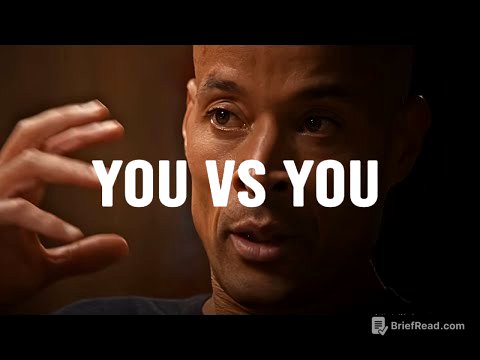TLDR;
This conference, organized by PsyCnam, features Vincent de Gaulejac discussing clinical sociology and its connection to work psychology. The discussion explores what clinical sociology offers to work psychologists, examining the history and theoretical underpinnings of this interdisciplinary approach. It addresses the current issues in the world of work, such as loss of meaning, psychosomatic symptoms, stress, burnout, and suicides, and touches on the methodologies used in clinical sociology.
- Clinical sociology and work psychology share a common origin, stemming from the same academic roots at Cnam.
- The discussion highlights the importance of considering the organization as a key element between the individual and society.
- The conference explores the concept of "paradoxical capitalism" and its impact on the well-being of individuals in the workplace.
Introduction [0:00]
The conference is organized by PsyCnam and welcomes Vincent de Gaulejac to discuss clinical sociology and its relationship with work psychology. The aim is to explore the contributions of clinical sociology to work psychologists, a question prompted by the frequent encounters with Vincent's work in their curriculum. The conference will begin with Vincent presenting clinical sociology and its connection to work psychology, followed by an exchange with participants from around the world. Participants are encouraged to submit questions via chat to facilitate a smooth discussion.
Vincent de Gaulejac's Opening Remarks [2:29]
Vincent expresses his pleasure at the invitation and his support for transdisciplinary discussions in the human and social sciences. He notes the international audience and reflects on how the format allows for global participation. He mentions his previous work on the social aspect of individuals, similar to his work with psychotherapists from various backgrounds. Vincent suggests that the question of what clinical sociology can offer to work psychologists should be reversed, inviting the audience to consider what they can bring to the field. He plans to provide a historical overview and then discuss theoretical aspects, particularly concerning the mutations in the world of work and the resulting malaise, including loss of meaning and psychosomatic symptoms.
Historical Context and Connections [5:15]
Vincent explains that the currents of work psychology and clinical sociology at Cnam share a common origin. He recounts his early experiences with Max Pagès, who developed psychosociology in France. He also recalls meeting Christophe Dejours in the late 1970s at Paris 7, where they were both students. He notes that the UFR of clinical human sciences, which they attended, later transformed into an UFR of psychoanalytic studies and was eventually overshadowed by behavioral and cognitive approaches. Vincent emphasizes that the history of disciplines involves ongoing battles. He mentions that the term "psychodynamics of work" developed later in the 1990s, around the same time that he and Christophe were working on related issues.
Diverging Paths and Key Differences [7:39]
Vincent discusses how his and Christophe Dejours' paths have been both distinct and intertwined since their early collaborations. He recalls a key discussion at Christophe's laboratory at CNAM, where he realized a major difference in their approaches: Christophe viewed organization as an artifact, while Vincent saw it as essential. Vincent's sociology is at the intersection of organizational sociology and work sociology. He mentions their joint participation in preparing Jean-Luc Mélenchon's 2017 campaign, highlighting their complementary yet different perspectives.
Influence of Yves Clot and Socio-Historical Context [11:26]
Vincent contrasts his approach with that of Yves Clot and the clinic of activity, noting that while he shares theoretical references with Christophe Dejours, his epistemology is quite different from Clot's. He mentions Clot's influence from Marxism and his own attempts to articulate political issues with a Marxist perspective on the contradictions between capital and labor. Vincent notes that terms like "exploitation" and "alienation," once commonly used, are now less frequent, though the underlying issues have likely changed form. He highlights that they all worked within a similar socio-historical context marked by managerial revolution, the shift from industrial to financial capitalism, the digital revolution, and the rise of psychosocial risks.
Theoretical Referents and the Importance of Organization [13:55]
Vincent emphasizes the importance of considering the organization as a key element between the individual and society. He recounts his time at Dauphine, a university of organizational sciences, and its transformation from understanding organizations to focusing on management and optimizing organizational function. He argues that management has become a science in service of power, rather than a science to understand how people experience organizations. He proposes that managerial ideology has become the dominant ideology of our time, presenting itself as pragmatic and objective while serving specific interests.
Sociopsychic Knots and Ideological Impact [18:56]
Vincent explains that clinical sociology focuses on the relationships between the individual and society, which he terms "sociopsychic knots." He emphasizes the inseparability of the social and the psychic, arguing that psychosocial risks should not be viewed solely as psychological or organizational issues. He references the France Télécom case as an example of institutional responsibility for employee well-being. He also mentions the concept of "psychic organizational systems," highlighting the transformation of defense mechanisms against suffering into management practices.
Paradoxical Capitalism and Methodological Approaches [23:08]
Vincent introduces the concept of "paradoxical capitalism," where management, once a mediator of contradictions, now presents impossible dilemmas. He illustrates this with the example of quality control processes that hinder actual quality work. He analyzes a statement from a financial director to reveal underlying paradoxes related to logic, freedom of thought, collectivity, and the purpose of business. He concludes by discussing the methodological approaches of clinical sociology, including the use of implication groups and socio-clinical intervention theater to address workplace issues.
Methodological Approaches: Group Work and Theater [29:47]
Vincent explains the methodological approaches of clinical sociology, emphasizing the integration of research and intervention, theory and practice. He details two main tools: implication groups and socio-clinical intervention theater. Implication groups involve individuals working on their difficulties and conflicts, analyzing their experiences in the context of broader transformations in the world of work. Socio-clinical intervention theater uses a technique called the "organigram," where participants act out conflicts within organizations, allowing for a deeper understanding of the contradictions at play.
Q&A: Ideology in Management and Opportunities in Clinical Sociology [37:49]
The Q&A session begins with a question on how to highlight the ideological aspect of work and management sciences. Vincent responds by sharing testimonies from students in prestigious management schools who feel conflicted about their career choices, recognizing the destructive aspects of managerial ideology. He uses the ORPEA scandal as an example. He suggests transforming the education in these schools to deconstruct ideologies rather than serve them. He also addresses a question about interventions in organizations, mentioning the dictionary of clinical sociology as a resource and providing examples of how they work with organizations using the "organigram" technique.
Case Study: Violence in Transportation and the "Organigram" [43:09]
Vincent shares a case study from a large transportation company facing conflict with unions over security. The company initially believed the issue was external violence, but through the "organigram" technique, it was revealed that the primary issues were related to management practices and the disconnect between prescribed tasks and actual work. This highlighted the invisible violence of management practices that hindered the institution's mission.
Paradoxes in Modern Society and the Loss of Meaning [56:49]
A question is posed about whether there are more paradoxes today than in the past and whether societal evolution makes them unbearable, especially for new generations. Vincent explains that in the past, society was structured around social classes with assigned identities, whereas today, the emphasis is on autonomy and success. He discusses the shift from a society of reproduction to a society of competition, where individuals are constantly evaluated and benchmarked. This creates an environment of controlled autonomy, where individuals are free to pursue their goals but are also subject to intense pressure and evaluation.
The Contradictions of Excellence and the Desire for Disaster [1:08:36]
Vincent explores the contradictions of the pursuit of excellence, where individuals are driven to achieve more and more, leading to burnout and a sense of failure. He discusses how the pandemic has led some people to question the value of this pursuit, leading to a refusal to return to traditional work. He also touches on the concept of "creation destruction" in capitalism, where the pursuit of growth and profit can lead to the destruction of the planet and the exploitation of workers. He mentions a forthcoming book that explores the unconscious reasons why society seems to be heading towards disaster.
Alternative Approaches and the Importance of Desire [1:23:14]
Vincent suggests that the first step in addressing these issues is to understand the system. He emphasizes the importance of not resigning oneself to the status quo and highlights the growing awareness within organizations of the need for change. He advocates for creating spaces for reflection and exchange within organizations to challenge the dominant paradigms. He also stresses the importance of art and creativity as means of expressing and processing anxieties and difficulties. He touches on the concept of sobriety as a potential alternative, but emphasizes that it must be chosen and not imposed. Ultimately, he argues that the key question is how to realize one's desire to be, which requires both individual reflection and connection with others.
Conclusion [1:33:17]
The conference concludes with thanks to Vincent for his presentation and insights into clinical sociology. Vincent expresses his gratitude for the opportunity to reflect on the world and the importance of spaces for such discussions. He emphasizes the value of clinical approaches in understanding the lived experiences of individuals and the need to offer frameworks that allow for creativity in the face of contradictions.









